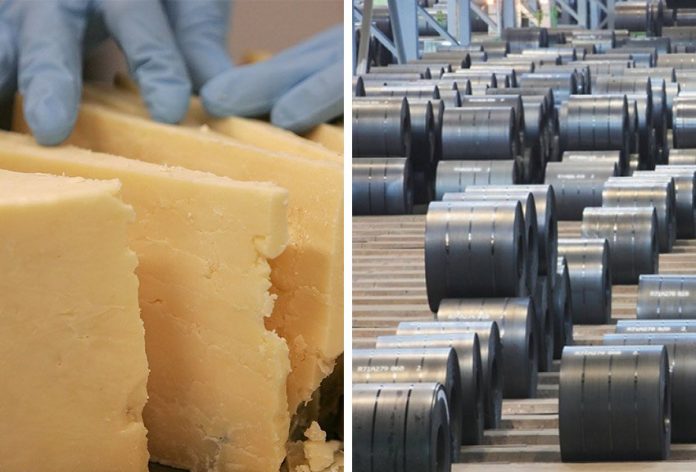A range of retaliatory measures against the United States’ metal tariffs took effect today, including 20% duties on U.S. pork, apples and potatoes.
Other measures Mexico imposed include 20-25% tariffs on cheese and bourbon and duties of up to 25% on steel products.
The Economy Secretariat (SE) published a full list of the U.S. products that will be affected by the new protectionist measures in the government’s official gazette, with tariffs ranging between 5% and 25%. Some further tariffs will come into force on July 5.
The Mexican peso dropped to its weakest level since February 2017 following the government’s announcement, to trade at more than 20 to the US dollar.
The United States announced last Thursday that it would impose 25% and 10% duties on steel and aluminum from Mexico, Canada and the European Union, prompting Mexico’s government to strike back swiftly by announcing it would impose its own “equivalent measures.”
Many of the products targeted are produced by exporters in states that are politically important to United States President Donald Trump.
News agency Reuters said that the retaliatory tariffs could “have political implications in some hotly contested races” in the United States midterm elections in November, in which the Republican Party is seeking to maintain control of both houses of Congress.
Pork-exporting Iowa is one example of a state that could be hurt by the Trump administration’s decision and the ensuing tit-for-tat measures. Bourbon-producing Kentucky and cheese-producing Wisconsin are others.
United States’ pork exports to Mexico were worth more than US $1 billion last year, according to government data, and between 2010 and 2017, 89.2% of all pork exports to Mexico came from the U.S.
Mexico is the second biggest market for United States’ pork exports and one-third of all pork consumed domestically comes from north of the border.
Jim Heimerl, an Ohio pork producer and president of the U.S. National Pork Producers Council, said the 20% tariff on pork legs and shoulders eliminates his country’s ability to compete in the Mexican market.
“The toll on rural America from escalating trade disputes with critically important trade partners is mounting,” he wrote in a statement. “This is devastating to my family and pork producing families across the United States.”
Economy Secretary Ildefonso Guajardo said that Mexico would now “surely” look to import more pork from Europe. He also said that the products to which the new tariffs apply were chosen to limit the impact on inflation.
Heriberto Hernández, president of the Mexican Association of Pork Producers (OPORPA), said that he supports the government’s decision and didn’t expert Mexican pork prices to go up because “there are a lot of alternatives” to U.S. suppliers.
Other countries that export pork to Mexico have been allocated a collective tariff-free quota of 350,000 tonnes that will remain in effect until the end of this year.
However, one Mexican producer disagrees with Hernández’s assessment that pork prices won’t rise.
“We believe that the meat [price] will go up 15, 16% and I think that it could have an impact on consumption, reduce consumption, and that’s what worries me the most,” said Víctor Manuel Ochoa, CEO of Mexico’s largest pork producer, Granjas Carroll.
In a radio interview this morning, foreign trade undersecretary Juan Carlos Baker rejected any claim that the tariffs amount to revenge on the United States, charging instead that Mexico was simply acting within its rights.
“In no way is this [tariff list] publication revenge . . . It’s a measure that Mexico has a right to in accordance with the trade agreement to compensate for the damage caused by the [United States’] tariffs, which they set under the alleged argument of national security,” he said.
If the United States removes its tariffs, Mexico will do the same, Baker added.
Mexico said yesterday that it will challenge the metal tariffs at the World Trade Organization, following the leads of Canada and the European Union.
The tariff dispute has further complicated already contentious and prolonged NAFTA negotiations and created further uncertainty about the future of the trilateral agreement. Canada also strongly condemned the measures and announced its own retaliatory tariffs.
Trump suggested last week that NAFTA could be replaced with two separate trade accords, one with Mexico and another with Canada.
But both U.S. neighbors are opposed to that possibility and Mexican President Enrique Peña Nieto and Canadian Prime Minister Justin Trudeau reaffirmed their commitment to reaching a new trilateral deal in a telephone conversation last week.
Trade with the U.S. is particularly important to Mexico because about 80% of its exports go to its northern neighbor whereas only around 16% of U.S. exports come to Mexico.
Two-way trade is worth US $600 billion annually but the U.S. has a deficit with Mexico of around US $65 billion, which Trump has argued is evidence of unfair trade between the two countries.
Source: El Financiero (sp), El Economista (sp), Reuters (en)
